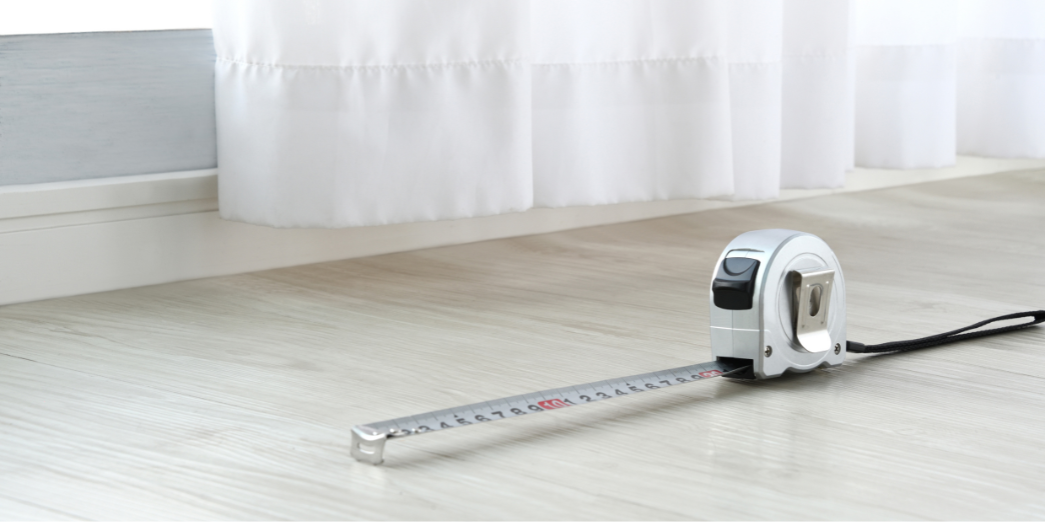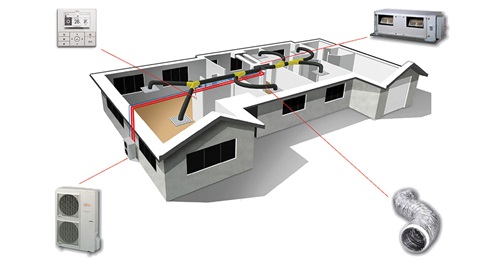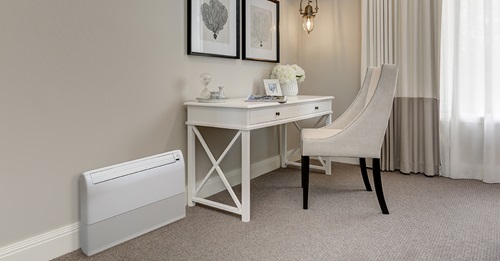Air Conditioner Room Size Guide

Choosing the right air conditioner for your room is essential for comfort, efficiency and energy savings. With this air conditioner size guide, we’ll explain how to match the air conditioner capacity to your room size, why correct sizing matters and share tips to avoid common mistakes — all the information you need to help you select the best unit for your space.
AC Size Guide: Where to Start?
The first step in choosing the right air conditioner is understanding that size matters. A unit that’s too small will never quite cool or heat a large or open space, while one that’s too big can waste electricity and increase costs.
When deciding on a new air conditioner, you should consider crucial aspects such as the square metres of the room, ceiling height, insulation and how much sunlight enters the space. These factors all affect the cooling and heating load, which is measured in kilowatts (kW). By working these out, you’ll have a clearer picture of the ideal capacity before you start looking at specific air conditioner types.
Why Air Conditioning Sizing is Important
Air conditioning isn't merely a luxury, it's a year-round comfort investment. As you will see in our air conditioner room size guide, the size of your unit also plays a role in how well it performs in the following areas:
Energy efficiency – A properly sized unit for a space operates within its designed capacity, consuming only the energy required. Undersized systems often run constantly, while oversized ones short-cycle, both leading to wasted electricity.
Comfort – With the right size, you’ll enjoy consistent cooling in summer and heating in winter without sudden changes in temperature or uneven air distribution.
System lifespan – Oversized units cycle on and off too frequently, and undersized systems work overtime. Both place unnecessary strain on the compressor and fan motors, reducing the lifespan of your unit.
Understand Your Space
Before selecting the right air conditioner, you need to really understand the space it will serve.
Room measurements – Multiply the length by the width of the room to get square metres (m²). For example, a bedroom that is 4m x 5m is 20 m².
Ceiling height – Most air conditioner size calculators assume 2.4m ceilings. If yours are higher, you’ll need more capacity. For example, a room with 3m ceilings has 25% more volume, requiring a bigger system.
Layout – Is the room closed off with a door, or is it part of an open-plan area? Open areas allow air to move between spaces, so greater capacity is needed to provide comfort.
Getting these basics right provides a good foundation for selecting the right unit.
Things to Keep in Mind
Room size is just the beginning. Other features of your home directly affect how hard your air conditioner has to work:
Insulation – Good insulation traps cool air in summer and warm air in winter, reducing the load on your system. Poor insulation allows heat to escape or enter easily, meaning the unit must run longer to maintain comfort.
Window placement – Windows are one of the largest sources of heat transfer. West-facing windows get the harshest, late-afternoon sun, which raises indoor temperatures right at the hottest part of the day.
Window type – The type of windows in your home plays a big role in efficiency — double or triple glazing acts like insulation, helping trap cool air in summer and warm air in winter.
Direct sunlight – Rooms that receive a lot of sun, particularly in the afternoon, can heat up quickly and require a higher-capacity unit. Rooms with less sun exposure often only need smaller systems.
Fujitsu Air Conditioner Size Guide: The Different Models
Fujitsu offers comprehensive air conditioning solutions to suit different room capacities and home needs. Here are some of the most popular options:
Wall Mounted Air Conditioners – Ideal for single rooms or smaller spaces, these systems are compact, efficient and easy to install.
Floor Mounted Air Conditioners – A great option when wall space is limited, offering powerful heating and cooling close to floor level.
Cassette Air Conditioners – Discreetly installed in the ceiling, these are perfect for open-plan areas or larger rooms where even air distribution is essential.
Multi-System Air Conditioners – Connect multiple indoor units to one outdoor system, providing flexible comfort in different rooms.
Ducted Air Conditioners – Ducted systems for complete climate control of your entire house.
Air Conditioner Guide - Room Size Calculator
Finding the right air conditioner size often comes down to room size and layout. A simple rule of thumb is to allow around 0.15 kW of cooling capacity per square metre of floor area. Use the below air conditioner size guide for Australia as a starting point when choosing your unit:
Room Size (m²) | Recommended Capacity (kW) | Example Application |
Up to 20 m² | 2.0 – 3.5 kW | Small bedroom, study |
20 – 30 m² | 3.5 – 5.0 kW | Larger bedroom, small living room |
30 – 45 m² | 5.0 – 7 kW | Medium-sized living area |
45 – 60 m² | 7.0 – 9.5 kW | Large open-plan space |
60 m² + | 9.5 kW + | Extra-large rooms |
Keep in mind ceiling height, insulation and sunlight exposure are all factors that may impact performance, so it's always best to use this as a guideline, not a rule. Another method of comparison between efficiency models is to look at the Energy Star rating on an air conditioner, you can find this under the ‘Technical Specifications’ section on our product pages.
For tailored advice, try the Fujitsu Assist Product Selector Tool, which recommends the most suitable Fujitsu system for your home based on room size and lifestyle factors.
Factors That Can Impact the Answer
The air conditioner size calculator above is a useful starting point, but it may not give an exact match for every home. Other factors can change how much cooling or heating your system needs:.
Climate
Where you live makes a big difference in air conditioning requirements. For example:
Sydney – mild coastal climate, moderate cooling and heating needs.
Hobart – cooler climate, stronger heating capacity often required.
Perth – hot, dry summers, higher cooling capacity recommended.
Darwin – tropical climate, heavy cooling load due to heat and humidity.
Brisbane – warm, humid summers, consistent cooling needed.
Canberra – inland climate with hot summers and very cold winters, strong heating and cooling flexibility required.
Melbourne – highly variable weather, with both hot summers and chilly winters, making year-round versatility important.
Insulation Quality
Homes with good insulation retain heat in winter and stay cooler in summer, meaning your air conditioner doesn’t have to work as hard. Poor insulation can increase both energy use and the size of the unit required.
Open-Plan vs Closed Rooms
Large open-plan areas tend to need a higher-capacity unit in order to sustain even temperatures, whereas rooms that are closed-off are more easily cooled or heated.Other factors to consider are sunlight exposure, ceiling height, window size and glazing and the number of people who will be using the area regularly.
Get a Professional Assessment with Fujitsu
While an air conditioner size guide or calculator can help, nothing beats getting advice from an expert. A licensed professional can assess the unique needs of your home — climate, room conditions, insulation and lifestyle and recommend the most suitable system for you. Fujitsu also offers reliable air conditioning services to keep your unit performing at its best.
Our specialists don’t just install your system, they’ll assist you in selecting the correct type and size, explain how to maximise energy efficiency and offer ongoing maintenance support. Whether it’s a single room solution or a whole home air conditioning system or, you’ll have confidence knowing your choice is backed by Fujitsu expertise.
Whether you're ready to install a new system or simply exploring your options, contact us today. Our team of Fujitsu specialists will guide you through product selection, installation, and ongoing support—so you can enjoy year-round comfort and peace of mind.

.tmb-tmb420.jpg?sfvrsn=5c4be2e1_1)


